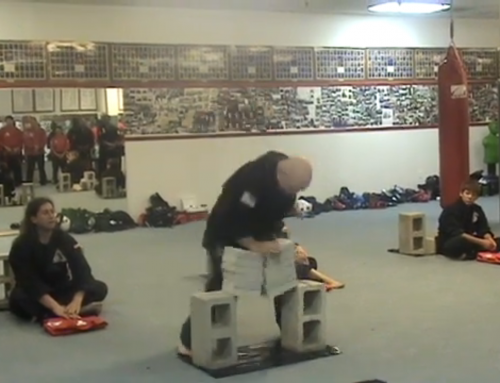As you recall from the previous issue of Locked On Leaders, my wife and I are hooked on the new show Special Forces: The World’s Toughest Test. This is the show where athletes and celebrities compete by going through a “selection process” that emulates, OK it is really an extremely diluted version of, the selection process that prospective special forces members go through in order to join their units. What makes this show special is that the participants aren’t competing for a tangible prize, they’re competing for their own reasons, to prove something to themselves.
In part 1 of this article, What You Can Learn From Reality TV, I talked about how each of the participants brought with them their own head trash, their own internal stories, their own self-doubt. I delved into how even high achievers limit themselves by their own beliefs and how the best of them handle their internal demons by embracing them.
As promised, today we’re going to take a look at how the Directing Staff, DS or simply Staff for short, lead. The DS are the four, former, special forces operators who are leading them through the 10-day selection process.
Setting Expectations
On day 1 the participants meet the Staff in some kind of simulated combat situation. There is gun fire, bombs exploding, and the staff screaming and shouting directions at the participants. To the uninitiated this may seem like pure harassment at worst or a way to assert dominance at best. It is neither. They are introducing the participants to a world and culture that is completely foreign to them; a culture where instant obedience to commands is required or people die; a world where you have to stay calm and composed while mayhem and chaos literally explode around you. The DS are also setting expectations. If you listen to the Staff, you will hear them telling the participants EXACTLY what is expected of them and why. It is not left a mystery.
All too often I’ve seen owners, managers, and other business leaders go easy on new employees because they “don’t know what’s expected.” Instead of telling them upfront, they wait to be “disappointed” because the new staff member “should have known better” and then they address it. Set your expectations early, then hold your people to them with compassion (more on that later).
We’ve all experienced that first day of school and the stern teacher who turned out to be one of our favorites. They’re the teacher from who we learned the most (I was going to say the teacher we learned the most from but she would be upset if I did that). It seems that as the year progressed, and we met her expectations, she got nicer.
While I’m not advocating putting new people in the stress of combat, it is critical you set clear expectations and that you hold them to them.
Hold Your Team Accountable
After the introduction, the real fun begins. The Staff put the participants through a series of evolutions each day. The evolutions are designed to test the participants physically, mentally, and emotionally. The Staff brook no excuse for failure or not attempting. Participants are told the only options they have are to attempt the exercise or voluntary withdrawal, period.
There are several occasions where one competitor or another try to get the staff to make an exception for various reasons. In every case the pleas fall on deaf ears. They get no sympathy from the Staff. They are asked if they wish to withdrawal and if not, they are told to get on with it. In the military in general our individual actions, our ability to perform or not, can have dire consequences beyond our immediate circumstances. In the world of Special Forces, frequently working with no or extremely limited support, this is even more pronounced.
Imagine if Patton’s 3rd Army had failed in their attempt to relieve the encircled 101st Airborne at Bastogne. Patton split the 3rd into two elements on the fly. Simultaneously continuing his defense against the Germans who were attacking from the east while pivoting half his army north to get to Bastogne, flawlessly executing a maneuver that commanders are expressly taught NOT TO DO because of the high likelihood of a disastrous failure. In this case failure would have likely meant the loss of all the Allied gains since D-Day, the loss of tens of thousands of lives, and possibly ich muss das auf Deutsch schreiben. Each man had to do their job.
The Staff did an amazing job pointing out how important it is to do what is necessary or others pay the price. Frequently I observe business leaders letting their team members off the hook claiming to be practicing grace. What about grace for the other team members who have to pick up the slack or grace for the customer who frequently pay the price in late products or services (even if they may not be aware of it)? What about grace for yourself when you have to deal with the same problem again because you let someone get away with it before?
This doesn’t mean the Staff is not empathetic. They acknowledge their own discomfort when demonstrating the evolution and they don’t denigrate the participants for voicing their fears or apprehension. In fact, they honor their action in the face of those fears. In other words, they reward what they value, courage.
I encourage you to do the same. Listen to your team’s concerns, acknowledge them, and don’t buy into them of you know the task can be accomplished or must be accomplished. If you hired the right people, trained them correctly, and know the task can be done it is just their own self-doubt. Allowing them to give in to it will stunt their growth while forcing them to act in-spite of the doubt will foster growth.
Caring About Your Team
The most fascinating evolution during the show is what the Staff calls “Tactical Questioning.” After each training evolution the DS get together and discuss the performance of each competitor. In addition to the physical capability, they talk about mindset, and attitude. The competitor who they deem the weakest overall gets called in for Tactical Questioning.
This involves two of the DS having a heart-to-heart talk; exploring the competitor’s motivation, mindset, and frequently uncovering their demons. Unlike other interactions, they are clearly coming from a place of caring about the competitor, frequently sharing some of their own stories and techniques they’ve used to deal with their own distractions, doubts, and demons.
The most interesting part about this evolution is how much the Staff cares about each competitor. They clearly want the best for them and want them to succeed. They want them to rise up to their standards. The camera catches many private conversations between staff that show they believe everyone can pass if they really have the drive to do so.
One of the most important questions they ask the participants is “why are you here?” The Staff know that this question is at the heart of success. Those participants with the strongest and clearest idea of what they want to get out of the program go the farthest.
The same holds in business. It is important to know what motivates your people. It’s not uncommon for owners and managers to tell me their people are motivated by money but strictly speaking that isn’t the case. I guaranty there are ways to make more money than whatever your team members are doing. If money was the answer, they would be doing something illegal with a high risk – high return rate.
When team members are “money-driven” it is really a surrogate for whatever they will buy. Typically, these are not the best team members. On the other hand, team members that are driven by your company’s purpose and are passionate about it will rise to the occasion and do what they need to. They’ll become assets that push past obstacles, do the hard work, and generally get the job done.
The bottom line, what works for the Special Forces and military in general will work for you. Be clear in your expectations, hold people accountable for their actions, and care about them without sacrificing your standards. Do all that and watch your team thrive.
Not sure how to implement any of this? Reach out to me here or by email for a complimentary strategy session and we’ll dig into what it would take for you to reach your goals.










